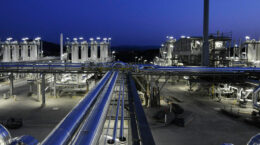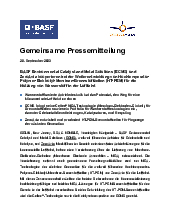BASF Environmental Catalyst and Metal Solutions (ECMS) and ZeroAvia partner to advance high temperature proton exchange membrane (HT-PEM) fuel cells for hydrogen-fueled aviation
- Hydrogen fueled propulsion can enable climate neutral aviation
- ECMS will contribute Celtec® membrane electrode assembly technology for fuel cells and its hydrogen-related portfolio including precious metal services, catalysts, components and recycling
- ZeroAvia will develop and produce HT-PEM fuel cell systems for next generation aircraft
ISELIN, NJ, USA & KEMBLE, UK – BASF Environmental Catalyst and Metal Solutions(ECMS), a global leader in precious metal services and catalysis, and ZeroAvia, the leader in zero-emission propulsion solutions for commercial aviation, have signed an agreement for the supply of membrane electrode assemblies (MEAs) and to collaborate on research on next generation MEAs for ZeroAvia’s world-leading high temperature proton exchange membrane (HT-PEM) fuel cell stacks for aviation. The companies will work together to accelerate the commercialization of a high-powered and lightweight MEA for HT-PEM fuel cells, suitable for the aviation market. The HT-PEM fuel cell utilizes ECMS’s Celtec® technology and catalyst expertise.
As part of this initial agreement, ECMS and ZeroAvia will also work to establish a long-term supply agreement for MEAs, including the supply and sourcing of the associated platinum group metals (PGMs) and PGM containing catalysts. Joint development work aims to enhance the components and materials supplied, thus increasing the performance of ZeroAvia’s overall HT-PEM fuel cell stacks.
For 20 years, ECMS has been a leader in membrane and MEA technology for HT-PEM fuel cells through its Celtec® brand. It also has a strong foundation in precious metal services and catalysis.
“We recognize the potential of our Celtec® technology to enable high-powered, lightweight, hydrogen-electric propulsion solutions and are committed to building a full loop supply chain for green hydrogen technologies including precious metal catalysts, components and recycling. We believe the close cooperation with ZeroAvia will accelerate this technology, supporting the industry’s ambition for climate neutral aviation," said Jason Cox, Global Head of the Hydrogen Business at BASF Environmental Catalyst and Metal Solutions.
ZeroAvia’s team achieved technological breakthroughs by delivering a pressurized HTPEM system. High temperature PEM fuel cells are a critical enabling technology for large, fixed-wing aircraft, rotorcraft and eVTOL applications. Increased temperature and pressure allow for air cooling, reduce cooling drag, simplify the system, and ultimately enable much more demanding applications.
ZeroAvia’s testing of its pressurized 20kW HT-PEM stack power module has already demonstrated an industry leading 2.5 kW/kg power at the cell level. The company is targeting a 3+ kW/kg system level power density over the next two to three years, which requires advances in various components within the stacks. This will help extend the technology from supporting regional turboprop aircraft, to potentially enabling hydrogenelectric propulsion systems for 100 plus seat narrowbody turbofan aircraft such as the Boeing 737 and Airbus A320.
“Partnering with ECMS enables us to accelerate our HT-PEM development, facilitating rapid development of our powertrains for large regional turboprop, regional jet and ultimately, even narrowbody aircraft,” said Rudolf Coertze, Head of R&D, ZeroAvia. “This agreement is an important step towards securing the components that will enable manufacture of the ZA2000 engines for 40-80 seat aircraft once certified in 2027.”




